Monica Peraza, serial entrepreneur and the first Hispanic woman to ever chair a major arts board in Austin, is on a mission to change the city and the world.
By Hannah J. Phillips, Photos by Andrew Chan, Hair & Makeup by Gertie Wilson
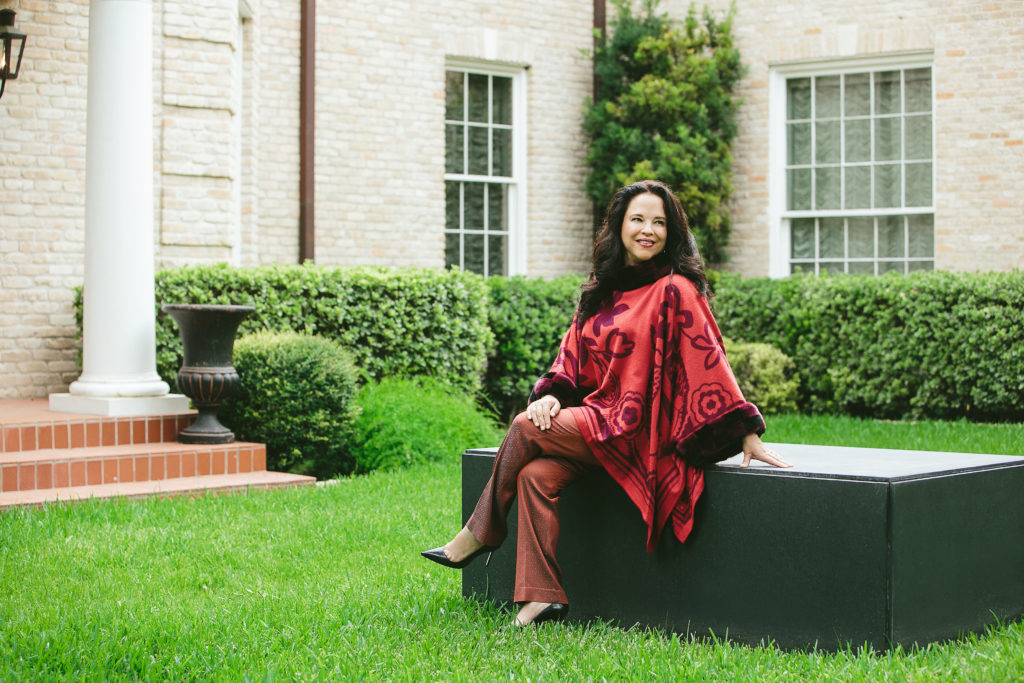
Monica Peraza remembers first hearing the term “serial entrepreneur” at a dinner party. The expression intrigued her. The words were just right somehow, affirming an identity she had always known but never named.
Peraza started her first business at age 7, crafting and selling plastic watercolor bracelets in Mexico City. Growing up as an only child of entrepreneurs, creative innovation was in her DNA.
These days, Peraza has moved on from bracelets. The founder of four successful companies and two nonprofits, and the chair-elect of the board of trustees for The Long Center for the Performing Arts, she is both an optimist and a pragmatist, a visionary and a problem-solver. To Peraza, dreams aren’t something to chase, but to map, strategize and achieve.
“I always knew that I wanted the freedom to create,” she says. “A lot of being an entrepreneur is just about the freedom to do what you want and what you are passionate about.”
But there’s more to entrepreneurship than freedom, more than identifying a need and finding a solution. Like explorers venturing into new frontiers, entrepreneurs possess the courage to take calculated risks, the creativity to navigate unforeseen obstacles and the commitment to see a mission through to the end.
Combining an exceptional ability to cultivate both long-term dreams and detailed immediate strategies, Peraza embodies all the best qualities of a genuine entrepreneur. In her path from serial entrepreneur to social innovator, she has honed a natural capacity to convert obstacles into opportunities. A true pioneer, she sees the mountains in her way as more than hurdles to surmount, rather as new vantage points from which to assess the next steps of the journey.
IDENTIFYING PROBLEMS, DESIGNING SOLUTIONS
As a marketplace by women and for women, Peraza’s latest venture, Alegreea, solves problems on both sides of the industry. From the perspective of an entrepreneur, Peraza saw the struggle of female makers trying to gain access and fair pricing in global markets. On the consumer side, she also noticed an increasing customer desire to purchase unique products with both a story and a social impact.
The solution came to her while building her third company, Dalma Imports, which introduced high-end products from her native Mexico to North American markets. Since Dalma worked with some of the largest retailers in the U.S., the company prioritized designers producing large volumes, but Peraza frequently wished she could create a platform to showcase the smaller quantities of lesser-known artisans and makers.
“We noticed that smaller designers were getting lost in the big marketplaces,” she says. “So, I started seeing the opportunity to create something that will do justice to their products and be able to highlight them as pieces of art.”
By providing access to the largest market in the world, Alegreea removes geographical barriers (the need to travel to boutiques willing to buy their products) and time constraints for female designers. Some 85 percent of women makers have children, limiting their time to create within the hours of school or day care.
Whereas most markets offer female designers 35 percent profit on a sale, Alegreea guarantees each maker 50 percent. Peraza believes increasing profitability for female designers enables them to grow a sustainable business and creates a cycle of happiness on both sides of the market. The company name comes from the Spanish word for happiness, “alegría,” and Peraza intends to spread that mission across the globe.
“The core of Alegreea is happiness,” she says. “We like to think that we bring happiness to our customers with the products we curate. … And as we create sales for women makers, that brings happiness into their lives too.”
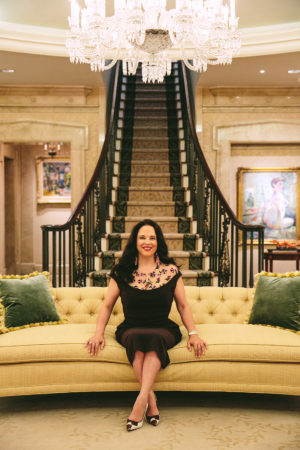 PREDICTING A CHALLENGE
PREDICTING A CHALLENGE
Beyond her role as CEO, Peraza sees herself as chief curator, protecting Alegreea’s core mission to foster relationships with makers and tell their stories. As the company expands its reach, however, Peraza knows she will have less time to personally curate each new collection.
“It’s all about building systems,” Peraza says. “A lot of people think that doing an online marketplace is pretty much like doing a web page, and it’s not. The hardest part of doing the two-sided marketplace is creating systems and funnels, making it an efficient process in order to scale the company.”
To consistently curate incoming designs as the company grows, she and her team developed a brief questionnaire for new designers, which, in turn, exposed a need for a 360-degree view of each new applicant and their products. Now the process is very straightforward: Alegreea automatically downloads information from designers, allowing Peraza and her team to quickly assess each maker’s story and how to best highlight their unique offerings.
In its seed round, Alegreea launched with collections from designers in Mexico before moving into its current focus on minority makers in the United States and Canada. Next, Peraza plans to tackle Latin America and beyond.
“By 2022, we will have makers all over the world,” she declares.
GIVING BACK TO THE COMMUNITY
Creating this kind of ripple effect is Peraza’s trademark in each endeavor. Perhaps more remarkable than her ability to scale several companies (often simultaneously) is the incredible diversity of projects she undertakes. Much to the benefit of her community, she is equal parts serial entrepreneur and social innovator, a pillar of both the business and nonprofit worlds in Austin.
Moving from New York City to Austin in 2006, Peraza formed MexNet Alliance to provide educational tools and mentorship opportunities for Hispanic entrepreneurs.
“Ever since I came to the U.S. in 1997,” she says, “I always questioned why people from Mexico were working in different parts of the industry, serving in the kitchens and washing dishes and not building businesses like other communities in the U.S.”
To address the unique barriers facing Hispanic entrepreneurs, she launched a five-week seminar called Emprendedor U to cover all aspects of business, from accounting and operations to marketing and social media. Led by serial entrepreneurs like Peraza, the intensive course is completely free, open to all applicants and entirely in Spanish.
PUTTING THE FUN IN FUNDRAISING
As the Emprendedor U program expanded, Peraza predicted the need for future fundraising in order to keep offering the course for free. With her inimitable flair for finding the untapped resource in every potential roadblock, she launched the Authentic Mexico Gourmet Gala. Not your average fundraiser, the annual event highlights the food and culture of a different state in Mexico each year and provides a platform for the talents of both emerging and renowned chefs.
“I love creating things I’m very passionate about,” Peraza says about the event. “Authentic Gala enables me to create from a completely blank canvas, and it showcases incredible cuisine.”
Now in its ninth year, the event eventually became the main fundraiser for the Hispanic Alliance and connected Peraza with Teresa Lozano Long.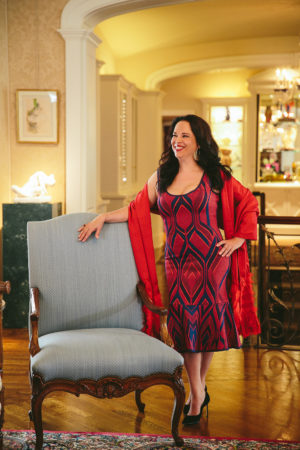
FINDING MENTORS, FORMING STRONG PARTNERSHIPS
At the end of 2010, Long approached Peraza with a desire to produce a
nonprofit focused on engaging Austin’s Hispanic community with the
arts. Their partnership would determine not only the founding of the
Hispanic Alliance, but also the trajectory of Peraza’s career.
“The Longs have been a pillar of the arts in Austin,” Peraza says. “[Teresa] saw how the Hispanic community was growing and that if we didn’t get involved in the arts at all levels, the arts were going to struggle.”
As the two began collaborating, they also observed a disturbingly high dropout rate in Austin’s high schools. Inspired by Venezuela’s innovative music-education program, El Sistema, the pair decided to tackle the two problems simultaneously, launching Austin Soundwaves in October 2011. Through high-quality musical training and mentoring opportunities, the program helps students develop the essential skills for creative, social and academic success.
MEASURING IMPACT
In that same year, the entrepreneurial programs at MexNet merged with the education and arts programs at the Hispanic Alliance to become one entity. Today, the Hispanic Alliance encompasses both Emprendedor U and Austin Soundwaves, plus a 13-week program for Hispanic women entrepreneurs called OLEH, or the Organizacion de Lideres Empresarias Hispanas, which Peraza founded in 2016 in partnership with the McCombs School of Business at the University of Texas.
With each of these three programs, the Hispanic Alliance fulfills its mission to transform lives by focusing on economic mobility through arts education for youth and entrepreneurial training for adults. Each one has had a measurable impact, quantifiable data Peraza shares proudly without the need to consult notes, as if displaying photos of her own children. More than 2,000 adults have attended Emprendedor U since 2009, more than 500 students have participated in Austin Soundwaves (which has seen a 100 percent high-school- student graduation rate since 2011) and nearly 200 women have graduated from OLEH since 2016.
“By transforming the lives of individuals, we transform the lives of families,” Peraza says. “And by doing that, we transform the community.”
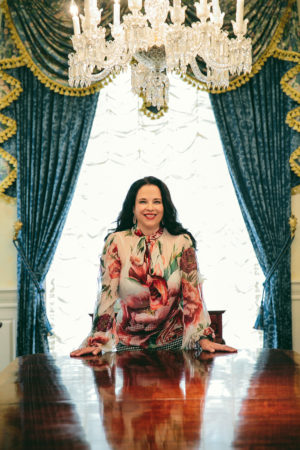 WALKING THE WALK
WALKING THE WALK
Working to get Hispanics engaged with the arts, Peraza realized she needed to practice what she preached, joining the board of trustees at The Long Center in 2011. October marks her eighth year on the board, and as chair-elect, she will become the first Hispanic woman to ever chair a major arts board in Austin.
Since joining The Long Center’s board, Peraza has served as a member of the executive committee and the finance committee and served as the chair of the strategic plan, an appropriate title for someone with such a rare knack for executing long-term visions.
“Monica approaches her nonprofit work as an entrepreneur,” says Patsy Woods Martin, founder of I Live Here, I Give Here and former chair of the board of trustees for The Long Center. “[She has] great passion, energy, commitment and follow-through.”
Peraza’s unique ability to consider both the forest and the trees, both to dream and to do, should excite Austinites for this new chapter at The Long Center. Through her tireless work in the Hispanic and arts communities, she is primed to transition the center into its next 10 years—and the city along with it.
“If you see the skyline of Austin 10 years ago, it’s a totally different city,” she says. “Joe and Terry’s vision for The Long Center was always for it to be a center for the community. After 10 years, we have found our personality, and our diversity is our strength.”
As chair, her top three priorities are to define the sustainability of The Long Center, measure its impact and build a stakeholder model of appreciation across the board—all building blocks in her vision to implement strategies that reflect diversity in The Long Center’s programming and the people it serves.
As if that vision, paired with her plans for going global with Alegreea, weren’t grand enough, she sees an even higher purpose on the horizon. And few would be surprised that while spinning these two plates, Peraza already has the next plate in her back pocket.
THE BIGGER PICTURE
Inspired by the impact the Longs have had in the Austin community, Peraza hopes to create something similar for the international community, establishing a foundation for women and children with a global footprint. Blending her expertise as a serial entrepreneur with her experience in the nonprofit world, it will be the culmination of all her work to date.
“I’ve been learning in Austin,” Peraza says, “and now Alegreea is allowing me to go into the world, so the next stage is a foundation that has a global impact, my dream come true.”
So, what new problem will her foundation solve? If Peraza’s experience as both entrepreneur and social innovator has taught her anything, it’s to not assume the answers ahead of time.
“The world is changing so fast,” she says. “So, it will be a time to sit down quietly and ask what is the reality for women across the globe, and really hear it from them.”
She wants the foundation to be collaborative, an organization that listens. Of course, she already has a few ideas. She plans to first utilize her travels with Alegreea’s international expansion as an opportunity to connect with female entrepreneurs throughout the world. Next, she plans to request proposals from social entrepreneurs and unique nonprofit models about how to make a big impact and change the lives of women across the globe.
But this will all take time. Until then, the world has only to watch and marvel as she implements her master plan, and to participate in the conversations she will no doubt set in motion. Wherever her path leads, it will be for both the benefit of her immediate community and for the world.
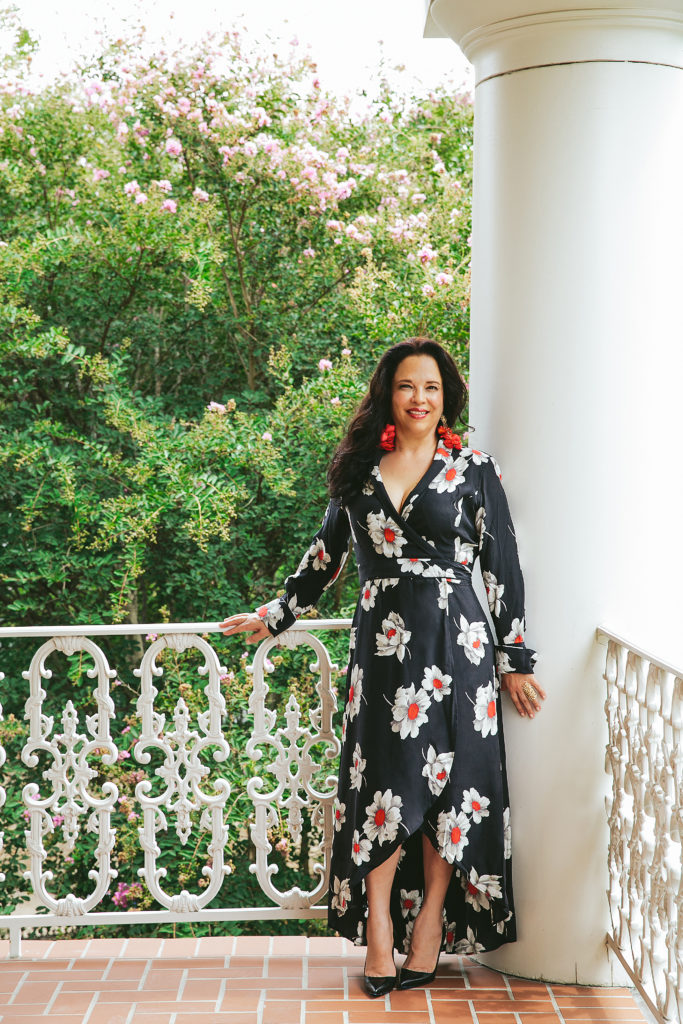
Blueprint for Success: Monica Peraza’s Pointers for Female Entrepreneurs
What does your daily schedule look like? “One of the things I teach and am passionate about is balance. I schedule my life first, my time for meditation and exercise.So, I schedule that and then my time with Alegreea. I commit to Alegreea until 3 p.m. every day, and then I have my meetings or calls with the nonprofits. And it’s very important to me to have eight hours of sleep.”
How do you juggle it all? “I focus 100 percent on what I have to do until the next thing. I love being able to come into a different project with a different state of mind and ask, ‘How can I make impact here?’ You become a little more mindful because you have a certain amount of time, so you have to ask, ‘How can I give the best of me to that right now?’”
What are the biggest challenges you face as an entrepreneur? “No. 1 is prioritizing time, being a mom and leading a business. Second is identifying the best opportunity in the market before it’s evident. Third is being aware of what I do well and what I don’t do well. Finally, I’ve learned that patience is a lifetime lesson. I like to do big things and I like to do things quickly. Sometimes you just need to wait a little bit.”
How do you overcome challenges? “Identify your shortfalls. We need to become a little more practical because an entrepreneur cannot do everything. There are things you need to learn how to do and things you need to delegate.”
What advice do you have for young entrepreneurs? “First, take care of yourself. … You only have one body and one mind. If you don’t nurture it and deal with the stress of life, you are not as sharp as you can be. Second, do things you are passionate about. It’s going to be the same amount of work, but the experience is totally different. When you are working in something you love, you thrive; it’s like time flies. Third, make sure you always give back in any way that you can. The world really needs all of us to give back. Find what talent you share with the world and do it!”

